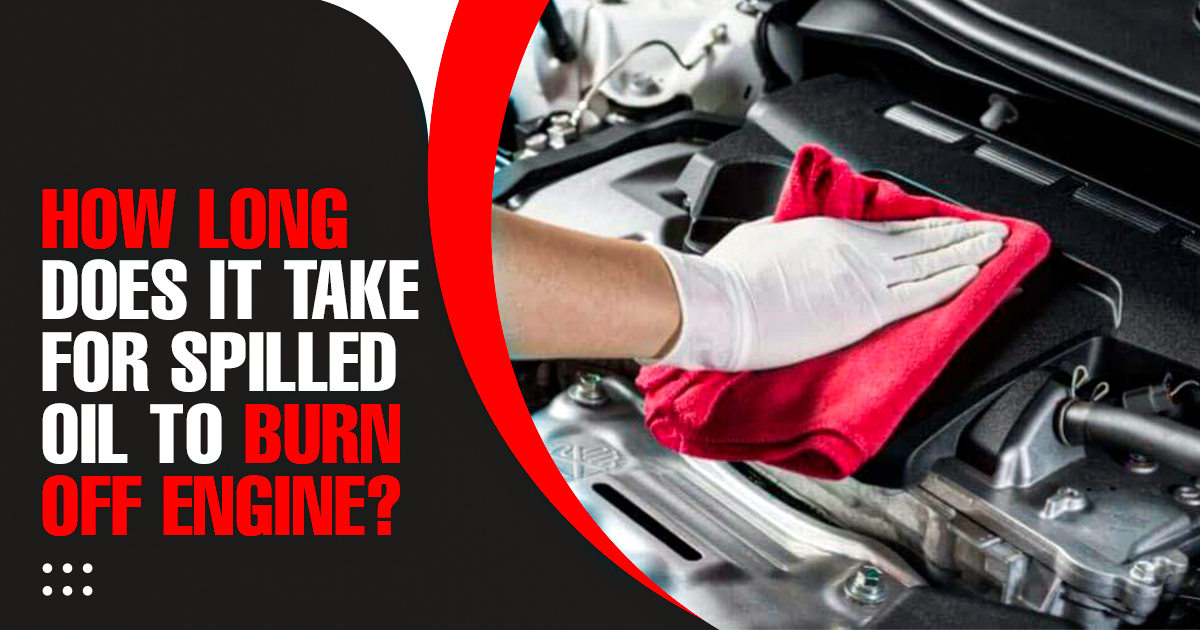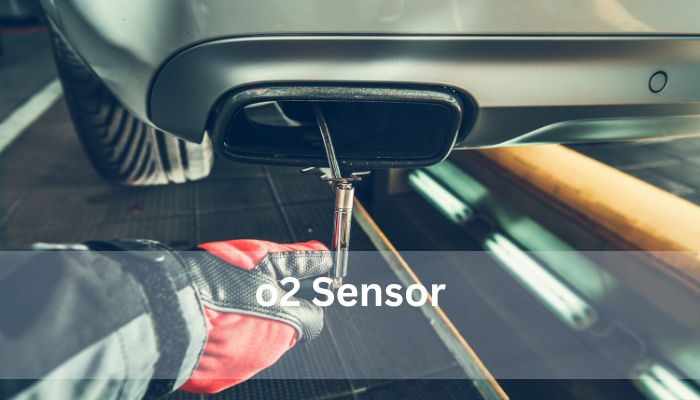How to Clean Oil Spilled on Engine
To clean oil spilled on the engine, use an oil spill absorbent and wipe the affected area thoroughly. You can also use degreaser for stubborn oil stains.
Oil spills on the engine can be a common issue for vehicle owners and can lead to potential hazards if not cleaned properly. The spilled oil can collect dirt and grime, causing a buildup that may affect the engine’s performance.
It’s important to address oil spills promptly to prevent any damage or safety risks. By following the right cleaning steps, you can effectively remove the oil spill and ensure your engine runs smoothly. Let’s delve into some effective methods and tips for cleaning oil spilled on the engine.

Credit: extendedautowarranty.com
Identifying The Oil Spill
When it comes to maintaining the health and performance of your car’s engine, dealing with an oil spill is crucial. It not only poses a safety hazard but can also lead to engine damage if not addressed promptly and correctly. In this section, we will discuss how to identify an oil spill on your engine and determine its source and severity.
Determining The Source
The first step in tackling an oil spill on your engine is to determine where it’s coming from. This will help you understand the root cause and prevent future spills. Here’s how you can assess the source:
- Inspect the engine compartment – Examine the engine compartment visually to locate any obvious signs of oil leakage. Look for oil stains, drips, or puddles. This will give you an initial idea of where the spill might be originating from.
- Check the oil filter and drain plug – Inspect the oil filter and drain plug to ensure they are tight and properly sealed. These are common areas where leaks can occur, especially if they were not tightened or replaced correctly during the last oil change.
- Examine gaskets and seals – Inspect the gaskets and seals in the engine compartment, such as those around the valve cover or oil pan. If these components are damaged or worn out, they can cause oil leaks. Look for any visible signs of degradation, such as cracks or bulges in the gaskets.
Assessing The Severity
Understanding the severity of the oil spill is crucial as it will determine the necessary steps to clean it up effectively. Here are some factors to consider when assessing the severity:
- Quantity of oil spilled – Assess the amount of oil that has leaked. Is it just a few drops or a significant amount? This will give you an idea of the cleanup effort required.
- Location of the spill – Determine where the oil has spread. Is it confined to a small area or has it spread to other parts of the engine? This will help you understand if there is a need for immediate action or if it can be cleaned up during the next scheduled maintenance.
- Potential damage to engine components – Consider the potential impact of the oil spill on critical engine components. If the oil has reached sensitive parts like electrical connections or belts, it may have caused damage that needs immediate attention.
By carefully determining the source and assessing the severity of an oil spill on your engine, you can take appropriate measures to clean it up effectively and prevent further issues. In the following sections, we will delve into the cleaning process and provide you with step-by-step instructions to ensure a thorough and efficient cleanup.
Safety Precautions
Safety precautions are important when cleaning oil spills on an engine. Ensuring the Protective Gear is worn properly and Engine Cooling system is not compromised is crucial.
Protective Gear
- Wear gloves and eye protection when handling hazardous substances.
- Use a face mask to avoid inhaling harmful fumes or particles.
Engine Cooling
- Allow the engine to cool down completely before attempting to clean any oil spills.
- Avoid direct contact with hot engine parts to prevent burns or injuries.
Materials And Tools Needed
To effectively clean oil spilled on the engine, you will need specific materials and tools to get the job done efficiently.
Absorbent Materials
- Absorbent pads or kitty litter
- Paper towels or clean rags
Cleaning Agents
- Degreaser or engine cleaner
- Dish soap or baking soda for gentle cleaning

Credit: www.autostore.pk
Cleaning Process
When it comes to cleaning oil spilled on an engine, it’s important to follow a proper cleaning process to ensure the debris is effectively removed and the engine is restored to its optimal condition. The cleaning process can be divided into two main steps: containment and absorption, and degreasing and cleaning.
Containment And Absorption
- Containment is the first step in the cleaning process, which involves preventing the oil spill from spreading further and causing more damage.
- To contain the spill, you need to place an absorbent material, such as an oil absorbent mat or a spill containment boom, around the affected area.
- The absorbent material will help absorb and trap the oil, preventing it from spreading to other parts of the engine or damaging nearby components.
- Make sure to cover the entire affected area with the absorbent material and secure it properly to ensure it stays in place during the cleaning process.
Degreasing And Cleaning
The second step in the cleaning process involves degreasing and cleaning the affected area to remove the oil residue and restore the engine’s cleanliness. Follow these steps to effectively degrease and clean:
- Start by preparing a degreaser solution by mixing a degreaser concentrate with water, following the manufacturer’s instructions.
- Apply the degreaser solution directly to the affected area, making sure to cover all the oil-stained surfaces.
- Let the degreaser solution sit for a few minutes to effectively break down the oil residue.
- Use a scrub brush or a soft cloth to gently scrub the affected area, loosening the oil residue and lifting it away from the engine’s surfaces.
- Make sure to scrub all the nooks and crannies where the oil might have seeped into, ensuring a thorough cleaning.
- Once the oil residue has been loosened and lifted, use clean water to rinse off the degreaser solution from the engine.
- Use a clean cloth or paper towels to dry the engine’s surfaces, removing any remaining moisture.
By following these steps of containment, absorption, degreasing, and cleaning, you can effectively clean oil spilled on your engine and restore its performance and appearance.
Preventive Measures
Preventive measures are essential to avoid oil spills on the engine. By implementing regular inspections and maintenance tips, you can significantly reduce the risk of oil spills and ensure the longevity of your engine.
Regular Inspections
Regular inspections play a crucial role in preventing oil spillage on the engine. It is recommended to inspect the engine for any signs of leaks or damage on a monthly basis. Look for cracked hoses, loose connections, or worn gaskets that could potentially lead to an oil spill. Additionally, checking the oil levels and pressure regularly can help detect any issues before they escalate.
Maintenance Tips
- Ensure proper torque on all oil system components to prevent leaks.
- Replace worn gaskets and seals during regular maintenance.
- Inspect and replace old or damaged hoses to prevent future leaks.
- Use high-quality engine oil and filters to maintain the integrity of the system.
- Regularly clean the engine to remove debris and prevent corrosion.

Credit: www.reddit.com
Frequently Asked Questions For How To Clean Oil Spilled On Engine
Is It Ok If I Spilled Oil On My Engine?
Spilling oil on the engine is okay, but it’s best to clean it promptly to avoid damage. Wipe off excess oil and use degreaser for any remaining residue. Regular maintenance will help prevent long-term issues.
How Long Does It Take Spilled Oil To Burn Off Engine?
Spilled oil usually burns off the engine within a few minutes of running.
Will Oil Spilled On Engine Catch Fire?
Oil spilled on an engine can catch fire due to high temperatures and ignition sources present.
What Should I Use To Clean Oil Off My Engine?
Use a degreaser or engine cleaner to effectively remove oil from your engine. Make sure to follow product instructions carefully.
What Are The Common Causes Of Oil Spills On The Engine?
Oil spills can be caused by damaged gaskets, loose oil caps, or overfilled oil reservoirs.
How Can I Safely Handle An Oil Spill On My Engine?
First, ensure the engine is off, then use an absorbent material to soak up the oil and dispose of it properly.
What Cleaning Products Can I Use To Remove Oil Spills From The Engine?
Avoid using harsh chemicals and opt for biodegradable degreasers or oil spill cleaning products for best results.
Conclusion
To effectively clean oil spilled on your engine, follow these simple steps. Start by wiping away any excess oil using a cloth or paper towel. Next, apply a degreaser to break down the oil residue. Allow it to sit for a few minutes before gently scrubbing the affected area.
Rinse the engine with water and dry it thoroughly. Regular maintenance and prompt action will ensure your engine stays in top-notch condition. Keep your engine clean and running smoothly!

